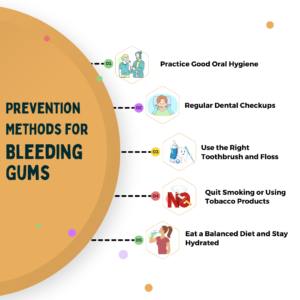Bleeding gums can be an early sign of underlying oral health problems that need attention. At Aruvi Aesthetic Dental Clinic, we understand the significance of this symptom and want to raise awareness about its causes, prevention, and treatment options. In this blog, we will discuss what bleeding gums are, the causes, how to prevent them, and the clinical treatments available.
Bleeding gums can have several causes, ranging from minor irritations to more serious health concerns. Below are the most common causes:
While bleeding gums may be a sign of a more serious condition, there are several preventive measures that can help maintain healthy gums and reduce the risk of bleeding.
1. Practice Good Oral Hygiene
The most effective way to prevent bleeding gums is to maintain a consistent and thorough oral hygiene routine. Brush your teeth twice a day using a soft-bristled toothbrush and fluoride toothpaste. Floss daily to remove plaque and food particles from between your teeth and along the gum line.
2. Regular Dental Checkups
Routine dentist visits are essential to prevent gum disease. A dental professional can remove plaque and tartar buildup, reducing the risk of gum inflammation and bleeding. Early detection of gum disease can also prevent its progression into more severe stages.
3. Use the Right Toothbrush and Floss
Avoid using hard-bristled toothbrushes and opt for a toothbrush with soft bristles and gentle brushing techniques to protect your gums. Choose floss that is easy to handle and fits comfortably between your teeth.
4. Quit Smoking or Using Tobacco Products
Quitting smoke and tobacco products can significantly reduce your risk of gum disease and bleeding gums. Tobacco use weakens the immune system and makes it more difficult for your body to fight off mouth infections.
5. Eat a Balanced Diet and Stay Hydrated
A balanced diet rich in vitamins and minerals, particularly vitamin C, can help maintain healthy gums. Include plenty of foods high in antioxidants. Drinking enough water helps wash away food particles and bacteria from your mouth. It also helps prevent dry mouth, that can contribute to gum irritation and bleeding.

If you experience frequent or severe bleeding gums, clinical treatment may be necessary to address the underlying cause. At Aruvi Aesthetic Dental Clinic, we offer several treatment options depending on the severity of the condition.
1. Scaling and Root Planing
If gum disease is the cause of bleeding gums, a professional cleaning treatment known as scaling and root planing may be recommended. This deep cleaning procedure removes plaque and tartar from below the gum line and smooths the roots of the teeth to prevent bacteria buildup.
2. Gum Surgery
For advanced gum disease (periodontitis), gum surgery may be necessary to remove damaged tissue, reduce pocket depths, and regenerate healthy gum tissue. This is typically done when non-surgical treatments are not effective.
3. Topical Treatments and Medications
In some cases, topical treatments or medications may be prescribed to reduce gum inflammation and bleeding. This could include antimicrobial mouth rinses or oral antibiotics to treat infections that may be causing the bleeding.
4. Vitamin and Nutritional Supplements
If bleeding gums are caused by a vitamin deficiency, supplements or dietary changes may be recommended to restore optimal gum health.
Bleeding gums should never be ignored. It is important to address the issue as soon as possible to prevent further complications. At Aruvi Aesthetic Dental Clinic, we are committed to helping our patients maintain healthy gums through effective prevention, personalized treatment plans, and expert care.
Contact us today to schedule a consultation. Our team is here to guide you toward a healthier, more confident smile!